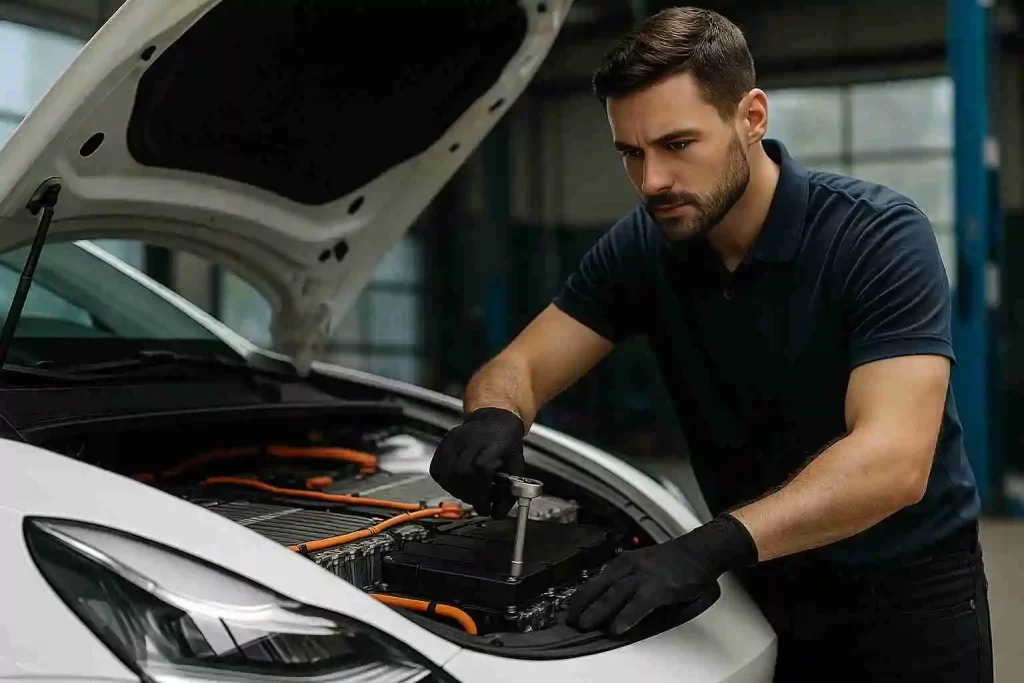Electric vehicles (EVs) have rapidly grown in popularity due to their environmental benefits, lower operating costs, and innovative technology. A key component of every electric car is its battery, making proper EV battery maintenance and timely replacement crucial for maximizing the lifespan, efficiency, and reliability of your vehicle. This comprehensive guide will provide practical insights and actionable steps to help EV owners maintain and, if needed, replace their car’s battery effectively.

Table of Contents
Understanding Your EV Battery
Electric vehicles predominantly use lithium-ion batteries, renowned for their energy density and longevity. The battery’s health directly impacts your car’s driving range, performance, and overall reliability. By understanding how these batteries work, you can significantly enhance their longevity and performance.
Your EV battery consists of multiple cells grouped into modules. These batteries store electrical energy and supply power to the motor, allowing your car to move. Proper care ensures these cells remain healthy and capable of holding a strong charge.
How Long Do Electric Car Batteries Last?
Typically, an EV battery can last anywhere from 8 to 15 years, depending on driving habits, climate, and maintenance practices. Most manufacturers provide warranties ranging from 8 to 10 years or up to 100,000 miles. Regularly maintaining your battery and avoiding detrimental practices can help extend its life significantly.
Practical Tips for Maintaining EV Battery Life
Maintain Optimal Charge Levels
Avoid frequently charging your battery to 100% or letting it discharge completely. Instead, maintain the battery charge between 20% and 80%. This range maximizes battery longevity and performance.
Moderate Temperature Exposure
Extreme temperatures, both hot and cold, negatively affect battery health. Park your vehicle in shaded areas or climate-controlled garages to reduce temperature impacts. Using thermal management features built into your EV helps regulate the battery temperature effectively.
Regular Driving and Charging
Consistent driving habits and regular, gentle charging maintain battery health. Sudden, rapid acceleration or frequent fast-charging can degrade your battery faster, so try to drive smoothly and charge at moderate speeds whenever possible.
Routine Inspections and Software Updates
EV manufacturers regularly provide software updates to improve battery management systems. Ensure your vehicle receives all updates promptly. Additionally, routine professional inspections can detect potential issues before they worsen.
Common Mistakes That Shorten Battery Lifespan
Avoid these common practices that negatively impact battery life:
- Frequently using fast-chargers: Fast charging is convenient but can accelerate battery wear.
- Ignoring battery warnings: Never ignore battery-related warning lights or messages.
- Long-term storage at high or low battery levels: Storing your vehicle unused with an extremely low or high charge can damage cells.
Signs Your EV Battery Needs Replacement
Knowing when to replace your battery is critical. Watch for these signs:
- Reduced driving range: Noticeable and consistent drops in driving range indicate battery degradation.
- Poor vehicle performance: Sluggish acceleration or slower charging speeds might signal battery health issues.
- Dashboard warnings: Persistent battery warnings on your dashboard should never be ignored.
If you experience these signs, it’s time for a professional battery health check.
Cost and Process of Replacing EV Batteries
Replacing an EV battery can be costly, typically ranging from $5,000 to $20,000, depending on your vehicle model and battery size. However, prices are decreasing as battery technology improves.
Replacement involves:
- Battery health diagnostics.
- Removal of the old battery.
- Installation and calibration of the new battery.
- Disposal or recycling of the old battery.
Some manufacturers offer battery refurbishment programs, significantly reducing costs compared to complete replacements.
Choosing the Right Service Provider
Selecting a reputable service provider is essential for reliable battery replacement. Look for:
- Certified EV technicians with specialized training.
- Providers offering warranty coverage on battery replacement services.
- Customer reviews highlighting professionalism and quality service.
Trustworthy providers use genuine or certified replacement batteries, ensuring optimal performance and longevity.
Recycling and Sustainability
EV battery recycling is vital for environmental sustainability. Batteries contain valuable materials like lithium, cobalt, and nickel, all recyclable and reusable. Proper recycling reduces environmental impact and supports resource sustainability. Many manufacturers and third-party companies offer recycling programs, sometimes providing discounts or incentives.
How Battery Technology is Evolving
Battery technology is continuously evolving, becoming more efficient, durable, and affordable. Future batteries promise longer lifespans, faster charging capabilities, and increased energy density. Innovations such as solid-state batteries could revolutionize electric vehicle performance, further reducing costs and improving environmental outcomes.
Can I replace individual battery cells?
Typically, individual cells aren’t replaced. Instead, complete modules or the entire battery pack are replaced to ensure balanced performance.
Is frequent charging bad for my battery?
No, moderate charging is beneficial, but excessive fast-charging can accelerate degradation.
Should I buy an extended battery warranty?
Extended warranties offer peace of mind, especially if you plan on keeping your EV beyond the original warranty period. Evaluate your long-term usage and budget to make the right decision.
Are refurbished batteries safe?
Yes, refurbished batteries from reputable providers are safe and reliable, often undergoing stringent quality checks and certifications.
Conclusion
Proper EV battery maintenance and understanding when to replace your battery can significantly enhance your vehicle’s lifespan, performance, and value. By following these practical tips and staying informed about your battery’s condition, you’ll enjoy reliable, efficient, and eco-friendly driving for many years to come.
FAQs About EV Batteries
How can I extend my EV battery life?
What charging habits harm EV batteries?
Charging to 100 % or running down to 0 % stresses cells and speeds degradation. Frequent DC fast-charging generates heat that wears the pack faster. Instead, stick to moderate charging speeds and mid-charge levels for everyday top-ups.
How do I know when my EV battery needs replacing?
If your range drops noticeably, charging takes longer than usual, or you see persistent battery-health warnings on the dash, it’s time for a professional check. These are telltale signs of cell degradation that only grow worse without intervention.
What does EV battery replacement cost?
Today’s pack swaps typically run from about $7,000 to nearly $30,000, though average figures cluster around $6,500–$20,000 depending on model, kWh and labor. Prices have fallen sharply as tech improves and volume rises.
How is an EV battery replacement done?
A technician diagnoses pack health, disconnects and removes the old battery, installs and calibrates the new modules, then tests the system. The old pack is sent off for recycling or refurbishment under strict safety protocols.
How should I recycle old EV batteries?
Used packs go to certified recyclers where they’re collected, transported, dismantled, and processed to recover lithium, cobalt, nickel, and other materials. This keeps toxins out of landfills and feeds raw materials back into new batteries.
How do temperature extremes affect EV batteries?
Heat speeds cell degradation and cold can reduce range and charging speed. Park in shade or a garage in summer, pre-condition your pack before charging in winter, and never charge immediately after a long hot drive to protect battery health.
